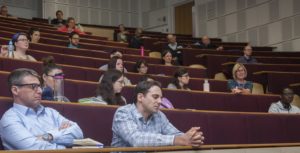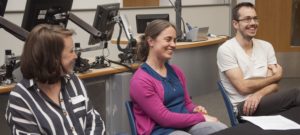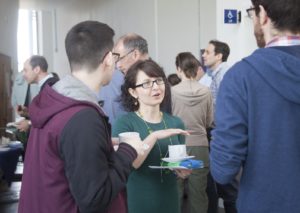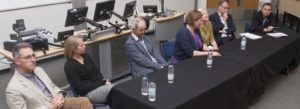Nick Brook, Dean of the Faculty of Science, welcomed postgraduate students and staff to our first Faculty networking event on Thurs 10th May. The eve nt focused on the support available across the University for career progression at different stages of the academic life cycle. Alongside this examples of good practice across Departments were highlighted.
nt focused on the support available across the University for career progression at different stages of the academic life cycle. Alongside this examples of good practice across Departments were highlighted.
Cathryn Mitchell (Academic Director of the Doctoral College) opened the event by asking ‘what makes a ‘Bath PhD’ a unique experience?’ The Doctoral College is placing more emphasis on postgraduate skills and training to enhance career development and building towards a certificate in research management. Anne Cameron from the Careers Service spoke about the range of services they can provide, including 1:1 discussions, to help students identify their career pathways. Lorenzo Caggiano (Postgraduate Director of Studies in Pharmacy & Pharmacology) drew attention to the difficult transition to independent and less structured postgraduate study many students experience ‘You are given a blank piece of paper and asked to fill it’. Postgraduates were urged to ‘Do something a bit scarey during your PhD’ by taking advantage of opportunities to try new things during their studies by Susie Douglas (Centre for Doctoral Training in Statistical Applied Mathematics).
The second session focused on postdoctoral researchers and their progression towards independent academic careers. Jeanette Muller (Academic Staff Development Manager) introduced the work of the ‘Research Staff Working Group’ at the University which represents research staff and seeks to improve the working environment and career management of researchers. They currently have a vacancy for a representative from the Faculty of Science if you would like to join the group and support projects looking at induction and support for early career researchers. Jeanette also highlighted the range of academic career development workshops both at Bath and across the GW4 (Bath, Bristol, Cardiff & Exeter) including a ‘kick start to HE teaching’ programme. The role of ‘early career lunches’ as a support network and discussion forum for career development issues in the Department of Physics was highlighted by Carolin Villforth. The challenges of becoming a lecturer and a father for the first time during probation were highlighted by Willem Heiltjes (Department of Computer Science). He shared his experience of taking extended paternity leave and trying to balance the added demands of a probationary lecturer neatly summarised as ‘Under promise and over deliver’.
Bristol, Cardiff & Exeter) including a ‘kick start to HE teaching’ programme. The role of ‘early career lunches’ as a support network and discussion forum for career development issues in the Department of Physics was highlighted by Carolin Villforth. The challenges of becoming a lecturer and a father for the first time during probation were highlighted by Willem Heiltjes (Department of Computer Science). He shared his experience of taking extended paternity leave and trying to balance the added demands of a probationary lecturer neatly summarised as ‘Under promise and over deliver’.
After a coffee break and chance to meet colleagues from across the Faculty attention shifted to academic staff promotion. Sarah Bailey (Faculty of Science Athena SWAN Champion) highlighted the role that Athena SWAN plays in supporting people’s journeys through career milestones. As articulat ed in the University’s institutional Athena SWAN award and the University of Bath strategy (2016-21), the University of Bath is committed to creating a welcoming, inclusive community that values the individual and supports the realisation of their potential. The role of mentoring was emphasized by Simon Inger (Talent Development Manager) who said that ‘Nurturing future generations is a normal part of academic life’. He highlighted that both informal and formal mentoring relationships were common across the University and encouraged people to take up the opportunity of having a mentor through the University’s mentoring scheme. Abigail Lyons (Faculty of Science HR business partner) outlined the current routes to promotion at the University. She dispelled the myth ‘You can only get promoted for your research’ by showing that the basis of successful promotion applications at the University is beginning to diversify at both Senior Lecturer and Professor levels. Susan Milner (Department of Politics, Languages and International Studies) discussed her role on the Academic Staff Committee. She highlighted that successful promotion cases are explicit in demonstrating how they meet the criteria for promotion and the impact that an individual’s contribution has made.
ed in the University’s institutional Athena SWAN award and the University of Bath strategy (2016-21), the University of Bath is committed to creating a welcoming, inclusive community that values the individual and supports the realisation of their potential. The role of mentoring was emphasized by Simon Inger (Talent Development Manager) who said that ‘Nurturing future generations is a normal part of academic life’. He highlighted that both informal and formal mentoring relationships were common across the University and encouraged people to take up the opportunity of having a mentor through the University’s mentoring scheme. Abigail Lyons (Faculty of Science HR business partner) outlined the current routes to promotion at the University. She dispelled the myth ‘You can only get promoted for your research’ by showing that the basis of successful promotion applications at the University is beginning to diversify at both Senior Lecturer and Professor levels. Susan Milner (Department of Politics, Languages and International Studies) discussed her role on the Academic Staff Committee. She highlighted that successful promotion cases are explicit in demonstrating how they meet the criteria for promotion and the impact that an individual’s contribution has made.

In a final discussion panel, Nick Brook (Dean of Faculty of Science), Jonathan Knight (Pro-Vice Chancellor for Research) and Steve Ward(Head of Department, Pharmacy & Pharmacology) were invited to describe their career pathways and how they had chosen to take on their current leadership roles. Interestingly, while they all had followed their interests, they all also highlighted the importance of good mentors, whether formal or informal, in helping them shape their careers and supporting them in taking the next steps. Indeed this was something of a unifying theme across the afternoon – the need for individuals to be proactive in managing their own career development at whatever stage in their career and for people to seek advice and support early in their careers. Individual Departments across the Faculty and University services offer a range of support and training opportunities to support career progression and hopefully this event has inspired postgraduates and staff to ‘do something a bit scary’ and perhaps seek out a mentor or take on a new challenge.
Sarah Bailey
Faculty of Science Athena SWAN Champion
Respond
